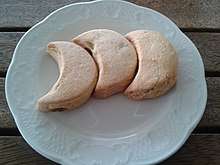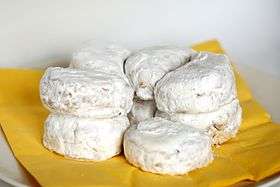Qurabiya
Qurabiya (also ghraybe, ghorayeba, and numerous other spellings and pronunciations) is a shortbread-type biscuit, usually made with ground almonds. Versions are found in most countries of the former Ottoman Empire, with various different forms and recipes.[1][2]
 Crescent shaped qurabiya | |
| Alternative names | ghraybe, ghorayeba, gourabia; Greece: kourabiedes, kourabiethes, kurabie; Morocco: ghoriba, ghouribi, ghribi;[1][2] Turkey: kurabiye |
|---|---|
| Type | Shortbread |
| Main ingredients | Almond flour, sugar, egg white, vanilla |
History
Cookies appear to have their origins in 7th century Persia, modern day Iran, shortly after the use of sugar became relatively common in the region.[3] A recipe for a shortbread cookie similar to ghorayebah but without almonds, called in Arabic khushkanānaj gharib (exotic cookie), is given in the earliest known Arab cookbook, the 10th-century Kitab al-Ṭabīḫ.[4] Kurabiye appears in the Ottoman cuisine in the 15th century.[5]
There is some debate about the origin of the words. Some give no other origin for the Turkish word kurabiye than Turkish, while others have given Arabic or Persian.[5] Among others, linguist Sevan Nişanyan has given an Arabic origin, in his 2009 book of Turkish etymology, from ġurayb or ğarîb (exotic).[6][7] However, as of 2019, Nişanyan's online dictionary now gives the earliest known recorded use in Turkish as the late 17th century, with an origin from the Persian gulābiya, a cookie made with rose water, from gulāb, related to flowers. He notes that the Syrian Arabic words ġurābiye/ġuraybiye likely derive from the Turkish.[8]
Regional variations
Iran
In Tabriz, they are made of almond flour, sugar, egg white, vanilla, margarine and pistachio. It is served with tea, customarily placed on top of the teacup to make it soft before eating.
.jpg)
Morocco
Called ghoriba in Morocco and other parts of the Maghreb, the popular cookies often use semolina instead of white flour, giving a distinctive crunch.[1][2]
Greece

The Greek version, called kourabiedes or kourabiethes[1][2] (Greek: κουραμπιέδες) resembles a light shortbread, typically made with almonds. Kourabiedes are sometimes made with brandy, usually Metaxa, for flavouring, though vanilla, mastika or rose water are also popular. In some regions of Greece, Christmas kourabiedes are adorned with a single whole spice clove embedded in each biscuit.[9] Kourabiedes are shaped either into crescents or balls, then baked till slightly golden. They are usually rolled in icing sugar while still hot, forming a rich butter-sugar coating.[10] Kourabiedes are especially popular for special occasions, such as Christmas or baptisms.[11]
Bulgaria
Kurabii name of the Bulgarian cuisine and the many varieties of cookie, a popular sweet variety. Especially during the holiday season, and a variety of jams produced via the new year with powdered sugar cookies decorated with cute shapes are called maslenki.
Turkey
The word kurabiye is used to refer to a variety of biscuits in Turkey, not necessarily local ones, although various types of local kurabiye are made; including acıbadem kurabiyesi and un kurabiyesi.
See also
References
- Davidson, Alan (21 August 2014). The Oxford Companion to Food. OUP Oxford. ISBN 9780191040726 – via Google Books.
- Marks, Gil (17 November 2010). Encyclopedia of Jewish Food. HMH. ISBN 9780544186316 – via Google Books.
- "History of Cookies - Cookie History". Whatscookingamerica.net. Retrieved 2015-02-27.
- Nasrallah, Nawal (26 November 2007). Annals of the Caliphs' Kitchens: Ibn Sayyār al-Warrāq's Tenth-Century Baghdadi Cookbook. BRILL. pp. 418, 569. ISBN 9789047423058 – via Google Books.
- Muhammed bin Mahmûd-ı Şirvânî (2005). 15. yüzyıl Osmanlı mutfağı. Gökkubbe. p. 259. ISBN 978-975-6223-84-0.
- Nişanyan, Sevan (2009). Sözlerin soyağacı: çağdaş Türkçenin etimolojik sözlüğü. Everest Yayınları. ISBN 9789752896369 – via Google Books.
- Salloum, Habeeb (25 June 2013). Sweet Delights from a Thousand and One Nights: The Story of Traditional Arab Sweets. I.B.Tauris. p. 128. ISBN 9780857733412 – via Google Books.
- Nişanyan, Sevan. "Kurabiye". Nişanyan Sözlük. Retrieved 2019-01-04.
- Sam Sotiropoulos (2009-12-23). "Greek Food Recipes and Reflections, Toronto, Ontario, Canada". Greekgourmand.blogspot.com. Retrieved 2014-03-16.
- "Irene's Kourabiedes (Kourabiethes) (Greek Butter Cookies)". Thursdayfordinner.com. Retrieved 2015-02-27.
- Sourligas, Christos (22 October 2019). My Big Fat Greek Cookbook: Classic Mediterranean Soul Food Recipes. Simon and Schuster. ISBN 9781510749849 – via Google Books.
